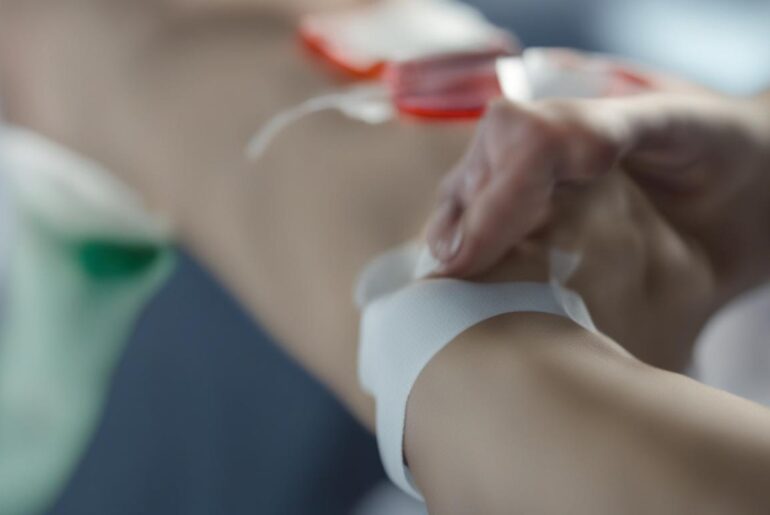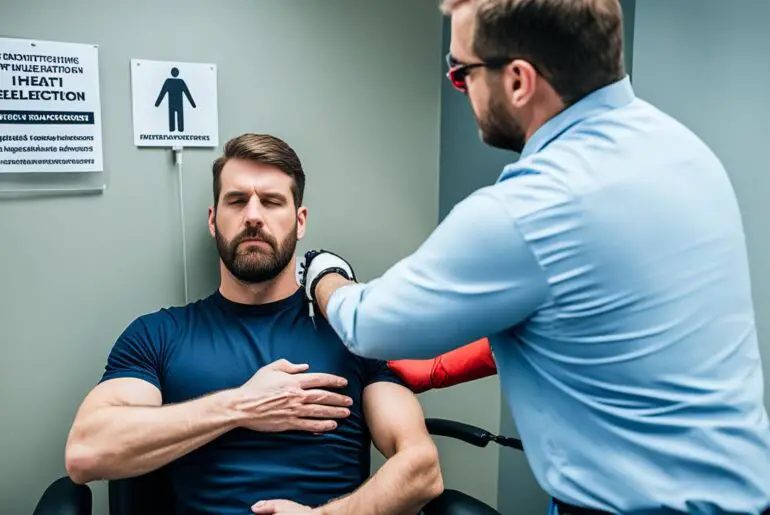Did you know that HCG injections, commonly used to treat infertility and hypogonadism, can pose potential risks when self-administered without professional supervision? It’s a surprising fact that highlights the importance of seeking medical guidance before embarking on HCG injections. While these injections have their approved uses, the dosage, administration, and monitoring of HCG injections are best managed by healthcare professionals to ensure safety and effectiveness.
Key Takeaways:
- Self-administering HCG injections without professional supervision can lead to potential risks and complications.
- Proper dosage, administration, and monitoring of HCG injections are crucial for their effectiveness and safety.
- HCG injections have approved medical uses for infertility treatment, but they should only be administered under the guidance of healthcare professionals.
- Consulting with a doctor or healthcare provider is essential before initiating HCG injections to ensure safe and appropriate use.
- Seeking professional supervision for HCG injections minimizes the potential dangers and maximizes the benefits of this treatment.
Purpose of HCG injections
HCG injections have various medical uses, primarily in the treatment of infertility in both women and men. In women, HCG injections are commonly used in conjunction with other medications, such as menotropins and urofollitropin, to stimulate ovulation and increase fertility. These injections are particularly beneficial for women undergoing in vitro fertilization (IVF), as they enhance the chances of successful pregnancy.
In men, HCG injections can help treat hypogonadism, a condition that affects testosterone production and fertility. By administering HCG, testosterone levels can be increased, improving fertility outcomes in men.
It is important to note that the use of HCG injections for fertility purposes should always be monitored and supervised by a qualified healthcare professional to ensure safe and effective treatment.
Medical Uses of HCG Injections:
- Female fertility treatment
- Male fertility treatment
Administration of HCG injections
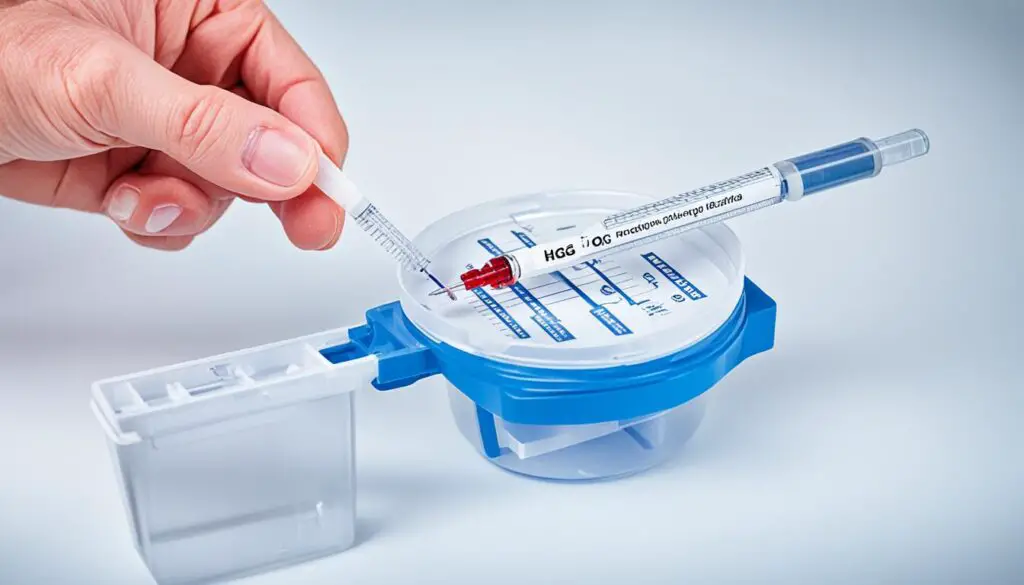
When it comes to administering HCG injections, there are two primary methods: subcutaneous injections and intramuscular injections. The appropriate technique for HCG injection depends on the individual’s preference and the guidance of a healthcare professional.
Subcutaneous Injection: Subcutaneous injections involve injecting the medication into the fatty layer just beneath the skin. This method is typically performed using a short 30-gauge needle, which ensures a comfortable experience for the patient. The subcutaneous injection sites commonly used for HCG injections include the lower abdomen, outer thigh, and upper arm. These areas provide adequate subcutaneous fat for proper absorption of the medication.
| Subcutaneous Injection Sites for HCG Injections |
|---|
| Lower abdomen |
| Outer thigh |
| Upper arm |
Intramuscular Injection: Intramuscular injections involve administering the medication directly into the muscle. A thicker 22.5-gauge needle is commonly used for this method. The intramuscular injection sites for HCG injections include the outer arm and upper outer buttocks. These areas have larger, well-defined muscles that can accommodate intramuscular injections effectively.
| Intramuscular Injection Sites for HCG Injections |
|---|
| Outer arm |
| Upper outer buttocks |
To ensure safe and effective administration of HCG injections, it is crucial to follow the proper technique and instructions provided by a healthcare professional. They can guide individuals in selecting the appropriate injection method, needle size, and injection site based on their specific needs and medical condition.
Risks and Side Effects of Self-Administering HCG Injections
Self-administering HCG injections without professional supervision can pose various risks and potential dangers. It is crucial to understand the potential dangers of self-injecting HCG and the importance of correct injection technique to ensure safety and effectiveness.
Potential Dangers of Self-Injection HCG
- Pain: Incorrect injection technique can result in pain at the injection site. A healthcare professional can guide you on the correct technique to minimize discomfort.
- Bleeding: Improper handling of needles can cause bleeding at the injection site. Following proper needle disposal and sterilization procedures is essential to prevent complications.
- Infection: Poor hygiene during self-injections can lead to infections at the injection site. It is vital to maintain proper hygiene and adhere to sterile practices while administering HCG injections.
- Improper Dosage and Absorption: Self-administration without proper training can result in incorrect dosage and absorption of the medication. This can impact the effectiveness and safety of the treatment.
Side Effects of HCG Injections
In addition to the potential dangers mentioned above, HCG injections can also have side effects that should be considered:
- Mood changes: Some individuals may experience mood swings and emotional changes while on HCG injections.
- Fluid buildup: Retention of fluids in the body can occur as a side effect of HCG injections.
- Enlarged breasts in males: HCG injections can cause gynecomastia, the abnormal enlargement of breast tissue in males.
- Blood clots: Although rare, blood clots can be a potential side effect of HCG injections. It is important to be aware of the signs and symptoms of blood clots and seek medical attention if necessary.
To minimize these risks and ensure the safe use of HCG injections, it is crucial to consult with a healthcare professional. They can provide proper guidance on injection technique, dosage, and monitor for any potential side effects or complications.
Safety Concerns and FDA Regulations for HCG Injections

When it comes to the safety and legality of HCG injections, it’s essential to understand the guidelines set by the FDA. While HCG injections are approved for specific medical purposes, such as fertility treatment, their off-label use for weight loss or other purposes is not approved by the FDA.
It’s important to note that over-the-counter HCG products, including homeopathic versions, are not legal or approved for weight loss. The FDA has issued warning letters to companies marketing these products as they do not meet the necessary safety and efficacy standards.
To ensure your safety and the effectiveness of HCG injections, it is crucial to only obtain and use them from licensed healthcare providers who follow FDA-approved guidelines.
| FDA Approval for HCG Injections | Approved for specific medical purposes, such as fertility treatment |
|---|---|
| Legal Use of HCG Injections | Only legal with a prescription from a licensed healthcare provider |
| Homeopathic HCG Products | Not legal or approved for weight loss; companies marketing these products have received FDA warning letters |
Being aware of the FDA regulations surrounding HCG injections is crucial for your safety and well-being. By following the approved guidelines and seeking guidance from healthcare professionals, you can ensure that you are using HCG injections in a legal and appropriate manner.
Effectiveness of HCG Injections for Weight Loss
The effectiveness of HCG injections for weight loss is a topic of debate. While proponents of the HCG diet claim its effectiveness in shedding pounds, scientific evidence does not support this claim. The HCG diet involves combining HCG injections with a very low-calorie diet, typically around 500 calories per day. However, studies have shown that the weight loss experienced on this diet is primarily attributed to the severe calorie restriction rather than the effects of HCG itself.
HCG, or human chorionic gonadotropin, is a hormone produced during pregnancy. It is believed by some that HCG injections can enhance weight loss by suppressing appetite and boosting metabolism. However, there is limited evidence to support these claims. The weight loss observed during the HCG diet can be attributed to the significant calorie deficit, which naturally leads to a reduction in body weight.
It is important to note that severe calorie restriction, as seen in the HCG diet, can pose risks and potential adverse effects. Very low-calorie diets can lead to nutrient deficiencies, muscle loss, and metabolic imbalances. Furthermore, these diets are difficult to sustain long-term, which may result in weight regain once normal eating habits are resumed.
Ultimately, when it comes to weight loss, it is crucial to adopt a safe and sustainable approach. Consulting with healthcare professionals, such as registered dietitians or physicians, can provide tailored guidance and recommendations based on individual needs and goals. They can help develop a comprehensive weight loss plan that includes a balanced diet, regular physical activity, and behavior modification strategies.
While the HCG diet may have gained popularity in certain circles, it is important to consider the lack of scientific evidence supporting its effectiveness. Sustainable weight loss is best achieved through a holistic approach that addresses overall lifestyle habits rather than relying solely on a specific diet or treatment.
Potential Side Effects of HCG Injections and Very Low-Calorie Diets
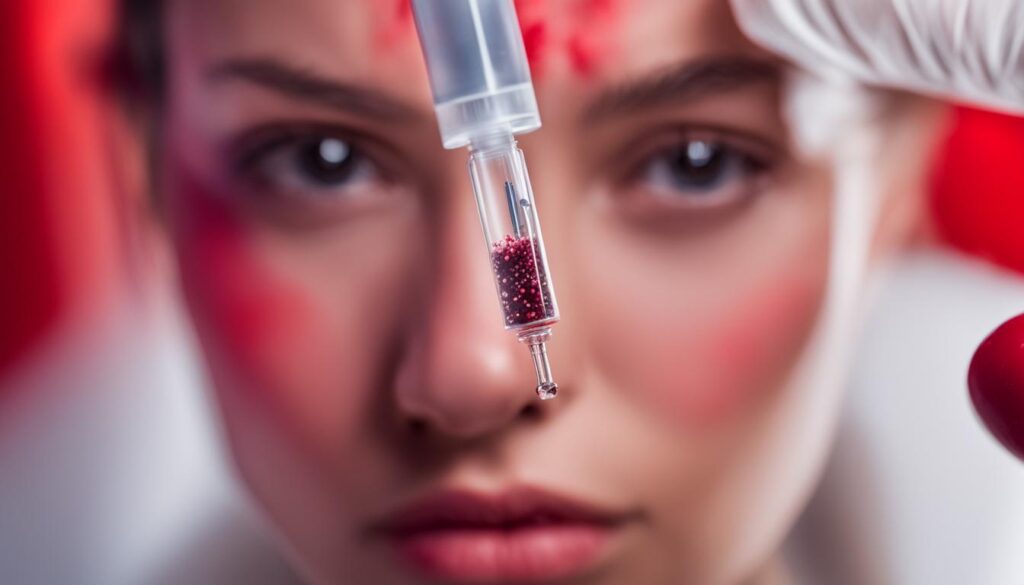
Both HCG injections and very low-calorie diets come with potential side effects and health risks. It is essential to be aware of these potential risks before embarking on any weight loss program involving HCG injections or very low-calorie diets.
HCG injections can have side effects that include mood changes, fluid buildup, and enlarged breasts in males. These side effects can vary in severity and may require medical attention. It is crucial to monitor any changes in mood or physical symptoms while using HCG injections and consult with a healthcare professional if necessary.
Additionally, very low-calorie diets, which typically restrict calorie intake to around 500 calories per day, can lead to various health risks and adverse effects. Such diets can result in nutrient deficiencies, muscle loss, electrolyte imbalances, and other complications. It’s important to consider the potential consequences of severely restricting calorie intake before engaging in a very low-calorie diet.
Risks of HCG Injections:
Here is a table summarizing the potential side effects of HCG injections:
| Side Effects of HCG Injections | Severity |
|---|---|
| Mood changes | Varies |
| Fluid buildup | Varies |
| Enlarged breasts in males | Varies |
Health Risks of Very Low-Calorie Diets:
And here is a table highlighting the potential health risks of very low-calorie diets:
| Health Risks of Very Low-Calorie Diets | Severity |
|---|---|
| Nutrient deficiencies | High |
| Muscle loss | High |
| Electrolyte imbalances | High |
As evidenced by the information provided, both HCG injections and very low-calorie diets carry potential risks and should be approached with caution. It is crucial to consult with healthcare professionals before starting any weight loss program involving HCG injections or very low-calorie diets. Healthcare professionals can provide guidance, monitor your progress, and help mitigate any potential risks.
FDA’s Stance on HCG Injections for Weight Loss
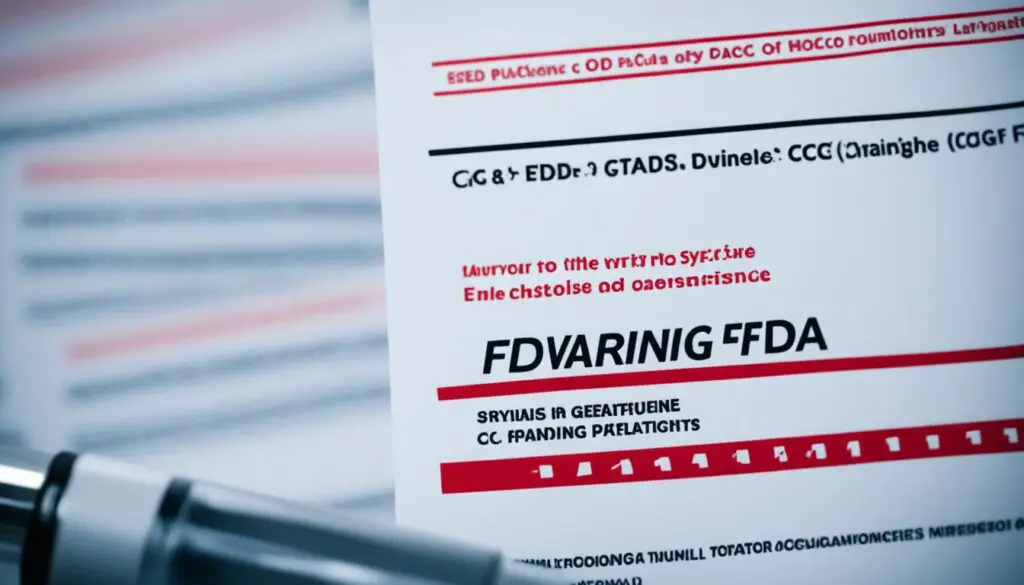
The FDA has taken a firm stance on HCG injections for weight loss. In July 2020, the FDA released a statement making it clear that HCG injections are not approved for weight loss purposes. The FDA explicitly stated that HCG is not approved without a prescription and is not approved for weight loss.
The use of HCG injections for weight loss is considered off-label, meaning it is not supported by scientific evidence and is not in accordance with FDA guidelines. This indicates that using HCG injections for weight loss is potentially risky and not recommended.
It is important to prioritize safety when considering weight loss strategies. Instead of opting for HCG injections, it is advised to consult with healthcare professionals who can provide evidence-based alternatives. There are numerous effective and approved methods for weight loss that can be explored under the supervision of qualified healthcare providers.
It is crucial to heed the FDA’s warning against HCG injections for weight loss and make informed decisions regarding health and wellness.
| Risks | Side Effects |
|---|---|
| Potentially risky | Mood changes |
| Off-label use | Fluid buildup |
| Not supported by scientific evidence | Enlarged breasts in males |
Conclusion
In conclusion, it is essential to prioritize safety when considering the use of HCG injections. These injections should only be administered under the supervision and guidance of a qualified healthcare professional. While HCG injections have approved medical uses for fertility treatment, their off-label use for weight loss is not supported by scientific evidence. Engaging in self-administration of HCG injections without professional oversight can pose potential risks and complications.
It is crucial to consult with healthcare professionals to ensure the safe and effective use of HCG injections for specific medical purposes. The dosage, administration technique, and monitoring of HCG injections should be carefully managed by healthcare providers to optimize safety and efficacy. Professional supervision is necessary to mitigate potential adverse effects and ensure the desired outcomes.
It is important to note that the FDA does not approve the use of HCG injections for weight loss. The FDA’s stance emphasizes the need for evidence-based approaches to weight loss and discourages the use of HCG injections for this purpose. Prioritizing one’s health and consulting with healthcare professionals is vital when considering any form of medical intervention, including HCG injections.
In summary, the safe use of HCG injections requires professional supervision and adherence to approved medical guidelines. It is important to consult healthcare professionals to explore alternative, evidence-based treatment options for weight loss. By prioritizing safety and seeking advice from qualified professionals, individuals can make informed decisions regarding the use of HCG injections for their specific medical needs.
FAQ
Are HCG injections safe without professional supervision?
No, HCG injections should only be administered under the supervision of a healthcare professional to ensure safety and effectiveness.
What are the medical uses of HCG injections?
HCG injections are primarily used for female fertility treatment and male fertility treatment in cases of infertility and hypogonadism.
How are HCG injections administered?
HCG injections can be administered through either subcutaneous or intramuscular injections, and the specific technique and injection sites should be followed as instructed by a healthcare professional.
What are the risks and side effects of self-administering HCG injections?
Self-administering HCG injections without professional supervision can pose potential risks, such as incorrect injection technique, pain, bleeding, infection, and improper dosage and absorption of the medication.
What are the safety concerns and FDA regulations for HCG injections?
HCG injections should only be obtained from licensed healthcare providers, and over-the-counter HCG products, including homeopathic versions, are not legal or approved for weight loss. The FDA has issued warning letters to companies marketing these products.
How effective are HCG injections for weight loss?
The effectiveness of HCG injections for weight loss is not supported by scientific evidence. While the HCG diet may result in weight loss, studies have shown that the weight loss is primarily due to calorie restriction rather than the effects of HCG.
What are the potential side effects of HCG injections and very low-calorie diets?
HCG injections can cause side effects such as mood changes, fluid buildup, and enlarged breasts in males. Very low-calorie diets can lead to nutrient deficiencies, muscle loss, electrolyte imbalances, and other adverse effects.
What is the FDA’s stance on HCG injections for weight loss?
The FDA has stated that HCG injections are not approved for weight loss purposes, and the use of HCG injections for weight loss is considered off-label and not supported by scientific evidence.
What is the conclusion on the safety of HCG injections?
It is crucial to consult with healthcare professionals and receive proper medical supervision when using HCG injections for specific medical purposes to ensure safe and effective use.


